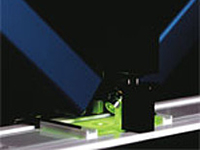Ellipsometry
Measurement of thin films and optical properties
Manufacturers of optics, semiconductor and optical data storage share the same problem: how to control the thickness of thin films or layers? The measurement has to be fast, non-destructive and, most important very precise. Therefore, laser-based methods are the first choice, ellipsometry the way to go.
Fields of Application
Ellipsometry measures a change in polarization as light reflects or transmits from a sample. The measured response depends on the optical properties and thickness of individual materials. Thus, the technique is primarily used to determine film thickness, but it is also applied to characterize composition, crystallinity, roughness, doping concentration, and other material properties associated with a change in optical response. Because ellipsometry analyzes the ratio of two values, it can be very precise and reproducible. As the measurement provides phase information, too, it also features a high sensitivity. For many samples, ellipsometry can measure film thickness on a monolayer level or even below.
TOPTICA's offer
Without doubt, such high-precision measurement technique relies on an extremely stable laser light source to begin with. TOPTICA’s industrial single-mode diode lasers provide highest power and pointing stability, both crucial to the process. Offering industrial laser solutions covering the wavelength range from the UV to the IR, TOPTICA will be happy to support you in your demanding application.
-
Related Products
-
Related Applications
-
Downloads
- Product Brochure: iBeam smart Family

